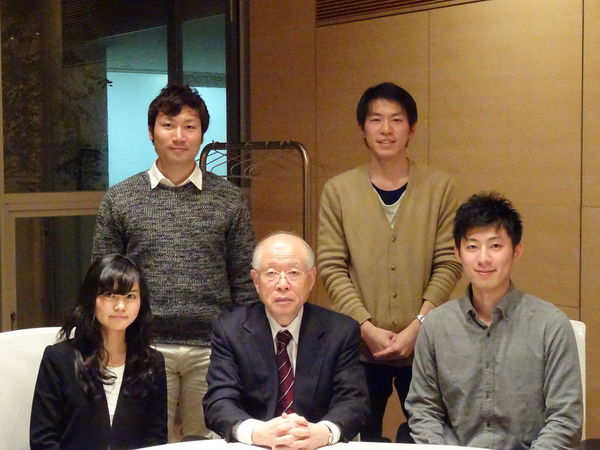Since January 2013, University Prof. Ryoji Noyori, a Nobel Laureate in Chemistry (2001), has contributed numerous articles to "Kamitsubute" in Chunichi Shimbun. Based on these articles, he holds regular academic discussions with students at Nagoya University. At the Nineteenth Noyori Academy Salon, held on January 29, 2016, Prof. Noyori and four students from different academic fields at Nagoya University discussed the topic "Supercomputer and the Future." Prof. Noyori emphasized that computer technology should be used according to the morals of human society.

Prof. Noyori
So far, science has developed through theory and experimentation/observation. With the arrival of the supercomputer, simulation, which is commonly considered the third mode of science, has now become a possible tool to complement and add to theory and experimentation.
Tomoki Osato, a junior at the School of Engineering
The supercomputer is an amazing technology that enables us to calculate unknown things or simulate experiments that we cannot perform.
Prof. Noyori
Hence, we expect the supercomputer to further develop science and technology. Possibly, we may also be able to predict 100 years into the future. While exploring the benefits of the supercomputer, we cannot just improve the quantitative aspects of what we did before; we must make qualitative changes, too.
Noritsugu Kitagawa, a junior at the School of Science
Environmental issues are influenced by human behavior. Can simulation give the answers about human activity as well?
Prof. Noyori
It would be difficult if humans are involved in the calculation, unless people’s behavior and emotions are scientifically understood. Although current computers cannot do all of these things at once, this would be expected of supercomputers in the future.
However, what I am concerned about is that we should not only rely on the efficiency and convenience of computers. The important thing here is that, we should have some morals and rules to advance the technology. It is a popular but nonsensical notion that computers and humans are at war these days. I suppose computers will win as humans are already behind computers in terms of knowledge and memory. In fact, people say that computers or artificial intelligence (AI) will become cleverer, and then half of our jobs will be replaced by robots.
Michiko Oya, a first-year PhD student at the Graduate School of Medicine
By doing so, we may create new occupations, particularly those targeting people’s communicative networks.
Prof. Noyori
New chances must be born, as seen in the spirit of “omotenashi” that is once again recognized as being important. Related to this, in academia, the humanities and social sciences are required to create new value through communication with the natural sciences. The more that science and technology increasingly develops, the more the importance of the humanities will be affirmed.
Takafumi Kondo, a second-year student at the Graduate School of Engineering
Regarding the safety in using the supercomputer, how can we cope with runaway technology?
Prof. Noyori
We have to approach science and technology carefully and make them more advanced. For example, nuclear power can supply us with almost infinite energy; in contrast, it potentially possesses the power to destroy human society. I am worried about what could happen, especially if AI could be developed to the point of possessing infinite intelligence.
We do not need to be pessimistic about this. What we can do first is to gather our knowledge and develop ways of correctly using AI.
Original article published in Chunichi Shimbun on January 30, 2016.